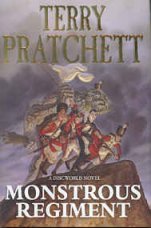
Monstrous Regiment
Terry Pratchett
352 pages
published in 2003
The second Discworld novel to come out this year, the first being Wee Free Men. Whereas that was intended as a young adult novel, Monstrous Regiment is part of the main Discworld series. Which in practise means that it delves deeper in Discworld continuity, has deeper undercurrents and is a somewhat less universal and a somewhat more political story. Both novels will quickly disabuse you of the notion that Pratchett is nothing more than a writer of humourous fantasy. There is still humour in Pratchett's books, but it has long ceased to be the main attraction in them.
Instead, what you have in Monstrous Regiment is satire in the tradition of Jonathan Swift, using the fantastic environment of the Discworld to shine some light on the real world. Not that it's as pretentious as I've just made it sound, but there's quite a lot there if you take the trouble to look for it. As with all of the mature Discworld novels, (of which I consider Maskerade to be the first) there's a deep sense of history and geography behind the story itself. It all feels real, it all makes sense (as far as anything on the Discworld makes sense), it never feels like it all takes place in front of cardboard decors and it never feels forced either.
The story itself is a classic adventure story, or at least that's how it starts out, with a girl, Polly Perks, who became a boy, Oliver Perks (or Ozzie) to enlist in the mighty army of Borogravia to search for her brother, who joined a year ago and was never heard from since. Borogravia is at war with Zlobenia at the moment, an annual reoccurence, as the border river has a tendency to wander... The war is going well, even if the recruiting is not going all that well, there are mainly old men working the fields and most of the soldiers returning from the war leave something behind... The Duchess, whose portrait is everywhere in Borogravia and who is as much revered as the local god, though never been seen since her husband died, will surely protectthe army.
As is the tradition with this sort of story, Polly's squad mates are a ragtag bunch. There's fat jolly recruiting seargeant Jackrum, somewhat more dangerous than he looks, there's a vampire, a troll, an Igor and several other ...odd.. boys. Together, as is also a tradition with this sort of story, they'll change the course of the war. Or maybe not.
There's a dark political undercurrent to this story, something stronger than Pratchett's usual mildly misanthropic humanism, beyond the obvious message that war is bad and absurd, an argument also made that war might actually be better than what certain classes of people have to deal with in daily life. For certain women, trapped in a traditional society, where anything out of the norm makes you a Bad Girl, who has to be Dealt With, the army and even war may be the only way in which they can escape the straight jackets of their society. The idea of a woman joining th army disguised as a boy is not something that happens in fiction of course -several real life examples can be found at http://www.lothene.demon.co.uk/others/women.html.
In some absurd way, Monstrous Regiment dovetailed nicely with the book I was reading before I spotted this in the local bookstore, Misha Glenny's The Balkans 1804-1999, Nationalism, War and the Great Powers, in the way the situation in Borogravia resembles the traditional western image of the Balkans, as well as the way these sort of 'little' wars are usually made worse by great power interference (in this case, Ankh-Morpork).
In all, this was a very absorbing read and indeed so absorbing that I finished it the same evening as I bought it, hardly being able to tear myself away from it. Recommended, this is as good or better as any of Terry Pratchett's recent Discworld novels.
